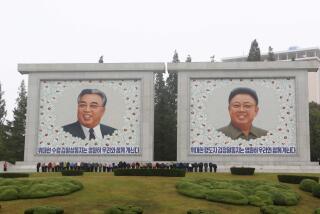Afghans Reject U.S. Call for End to Aid From Soviets
GENEVA — The Afghan government today rejected Washington’s demand that a simultaneous cessation of U.S. and Soviet military aid be part of an Afghan peace settlement.
Afghan Foreign Minister Abdul Wakil said Soviet assistance cannot be compared to U.S. aid for “terrorist groups,” a reference to guerrillas fighting the Kabul government.
“Afghanistan has always received Soviet assistance and will continue to receive it even after the withdrawal of the Soviet troops,” he said. He did not specify what kind of aid he was talking about.
Wakil charged that the United States is trying to introduce a new issue just as the nearly 6-year-old Afghanistan peace talks appear close to conclusion.
Deadlock Possibility
The same approach, he said, was used by Pakistan when it insisted that formation of an interim government to replace the current Kabul government be linked to an agreement to withdraw Soviet troops.
Asked whether these two points could produce a deadlock, he responded, “Don’t you think so?”
Wakil told reporters that the latest round of U.N.-mediated talks has produced “nothing important” since agreement was reached last week on the timetable for withdrawal of an estimated 115,000 Soviet troops in Afghanistan.
The Soviets intervened in Afghanistan in December, 1979, to back Kabul in a war that has been waged for nine years.
Sees Stalemate Effort
Wakil accused Pakistan, which represents the guerrillas in the talks, of resorting to “maneuvers to push the Geneva negotiations toward stalemate.”
But he said the Afghan side is determined to push for a speedy conclusion.
Soviet leader Mikhail S. Gorbachev has said Moscow will bring home its troops starting May 15 if a peace package is signed by next Tuesday.
Asked whether Afghanistan is prepared to continue negotiations if that target date is not met, Wakil said, “Regardless of whatever new obstacles the Pakistanis are going to create, we are determined to move seriously toward the finalization of the agreements.”
Earlier Confidence
Wakil’s comments contrasted with the cautious confidence displayed earlier this week by U.N. mediator Diego Cordovez and the chief Pakistani representative, acting Foreign Minister Zain Noorani.
Cordovez spoke Tuesday of “substantive” progress in readying the documents that make up the settlement.
Sources close to the Pakistani delegation said Noorani hopes that some deal can be struck on the issue of the interim government, perhaps by a compromise on the timing of its formation.
For the fourth straight day, the separate meetings Cordovez had with the Pakistani and Afghan delegations were confined to the morning. Cordovez earlier told journalists that no spectacular developments can be expected to emerge from the talks before next week.
More to Read
Sign up for Essential California
The most important California stories and recommendations in your inbox every morning.
You may occasionally receive promotional content from the Los Angeles Times.










